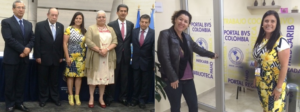The technical cooperation agreement between Fundación Universitaria de Ciencias de la Salud (FUCS) and the Pan-American Health Organization/World Health Organiz
ation (PAHO/WHO) for the consolidation and positioning of the Virtual Health Library (VHL) in Colombia was signed in Bogota, on September 12th, 2016. On the occasion, Dr. Gina Watson, PAHO/WHO Representative in Colombia, highlighted the points that support the VHL strategy as an open window to knowledge, as well as the importance of applying evidence-based knowledge to reach the Sustainable Development Goals (SDG), close the inequity gap and put an end to poverty.
Dr. Gina Watson admitted that Colombia VHL is going through a new stage in its history that will give the country new opportunities to share health information and knowledge, now under FUCS leadership, which was represented by its Principal, Sérgio Augusto Parra.
Some of Dr. Gina Watson´s general ideas include:
“For PAHO, the VHL is not merely an institutional topic. The VHL’s objective is to open knowledge to all those in the health area in need of — scholars, clinicians, students and the general population. The VHL is based on a network rationale that unites libraries, academic institutions and other sectors and that are supported by BIREME, which, in turn, makes this work available to everyone.”

“In the current world, with technological development and virtual networks, there is no reason why not to make available to users – Public Health thinkers and healthcare colleagues – all information available throughout the world, particularly that produced by the Organization in the Americas and together with WHO”.
“Today, this Virtual Library Network is positioned as one of the most representative sources of biomedical information in Latin America and the Caribbean, being present in 30 countries and 115 national and thematic instances, and with expectations of further growth.”
“Today, more than ever before, the medical practice and health actions have to be supported on evidence that can be validated and that is actually based on critical reality and that will enable us – in the next 15 years – to be the generation that will close the inequality gap, put an end to poverty, and manage to save our planet.”
“Through BIREME, we will have an open window to the world of scientific knowledge, an unrestricted window to many sources structured at global level that can be useful to us all at any time. As we learn more about what we do, we are convinced we can move forward, progress, and achieve what we all want—which is universal health”.
In summary, this all reflects the need to be able to implement and apply information and knowledge, and also to develop the capacity to innovate and meet the needs of all countries of the region with the support of BIREME.